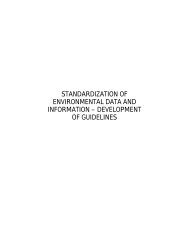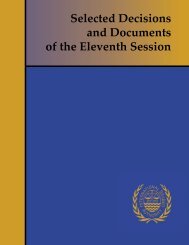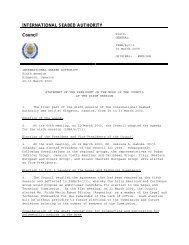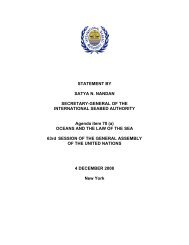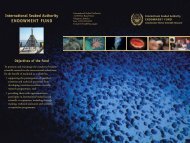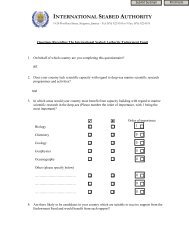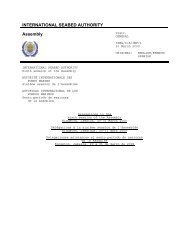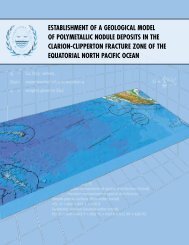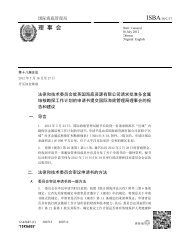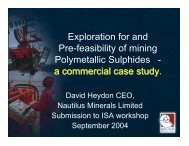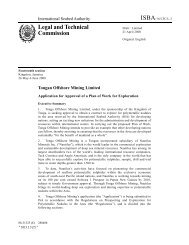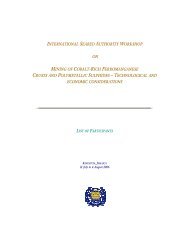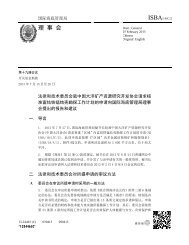Selected Decisions and Documents - International Seabed Authority
Selected Decisions and Documents - International Seabed Authority
Selected Decisions and Documents - International Seabed Authority
You also want an ePaper? Increase the reach of your titles
YUMPU automatically turns print PDFs into web optimized ePapers that Google loves.
76. The most recent workshop took place in February 2008 in Chennai, India, at the National Institute for<br />
Ocean Technology. The objective of this workshop, as stated in the report of the Secretary‐General to the<br />
fourteenth session, was to develop a preliminary cost model for a deep seabed polymetallic nodule mining<br />
<strong>and</strong> processing venture. As part of the work programme for the period 2008‐2010, it is proposed to convene<br />
two further international workshops in 2009 <strong>and</strong> 2010. The objective of the first workshop, scheduled for<br />
2009, will be to review the geological model of polymetallic nodule deposits in the Clarion‐Clipperton zone<br />
(see paras. 91‐93 below). The objective of the second workshop, which will be convened in 2010, will be to<br />
ascertain the modalities for scientific collaboration in research on cobalt‐rich ferromanganese crusts deposits<br />
in the Area with a view to addressing the st<strong>and</strong>ardization requirements for the environmental data required<br />
for mining.<br />
77. Five of the international workshops convened by the <strong>Authority</strong> have covered issues associated with<br />
managing the possible impacts of mining on the marine environment. Specific recommendations from these<br />
workshops relating to collaborative scientific research have included proposals for:<br />
(a)<br />
(b)<br />
(c)<br />
(d)<br />
Collaborative studies on the natural variability of the deep‐sea ecosystem, consisting of<br />
interdisciplinary variability studies of areas under contract, <strong>and</strong> unification <strong>and</strong> st<strong>and</strong>ardization<br />
of research <strong>and</strong> development methods;<br />
Cooperative biological research on the typical latitudinal <strong>and</strong> longitudinal ranges of benthic<br />
species, the rate <strong>and</strong> spatial scales of gene flow <strong>and</strong> the natural patterns <strong>and</strong> scales of benthic<br />
community variability in space <strong>and</strong> time;<br />
Taxonomic coordination utilizing recognized experts to assist in the correct identification of<br />
animal fauna living on the deep seabed for the purposes of establishing the geographical ranges<br />
of species <strong>and</strong> thus the likelihood of their extinction by a mining operation;<br />
The creation of databases by the <strong>Authority</strong> to enable contractors of keep up to date with the<br />
environmental data <strong>and</strong> information collected by other contractors <strong>and</strong> researchers, <strong>and</strong> to<br />
facilitate the work of the Legal <strong>and</strong> Technical Commission <strong>and</strong> the other organs of the<br />
<strong>Authority</strong>.<br />
78. The <strong>Authority</strong> has taken steps to progressively address these recommendations in its substantive<br />
programme of work (see paras. 82‐93 below). However, it is clear that much more collaborative work among<br />
contractors, marine research organizations <strong>and</strong> the <strong>Authority</strong> is required if the international community is to<br />
be able to take informed decisions on matters ranging from managing impacts to establishing marine<br />
protected areas in the Area.<br />
2. Regional seminars<br />
79. During the debate on the report of the Secretary‐General to the fourteenth session, many members<br />
of the <strong>Authority</strong> expressed support for the newly developed programme of regional sensitization seminars on<br />
marine minerals <strong>and</strong> other issues relevant to the work of the <strong>Authority</strong>. The purpose of these seminars is to<br />
inform government officials, marine policymakers <strong>and</strong> scientists at national <strong>and</strong> regional institutions of the<br />
work of the <strong>Authority</strong> <strong>and</strong> to promote the participation of scientists from institutions in developing countries<br />
in marine scientific research being undertaken in the Area by international research organizations.<br />
80. The first such seminar had taken place in March 2007 in Manado, Indonesia. A second seminar was<br />
convened in Rio de Janeiro, Brazil, from 26 to 28 November 2008, in collaboration with the Ministry of Mines<br />
<strong>and</strong> Energy of Brazil, the Ministry of Foreign Affairs of Brazil, the Ministry of Defence <strong>and</strong> the Division of<br />
Marine Geology of the Geological Survey of Brazil. Additional sponsorship was provided by Petrobras. The<br />
seminar attracted 115 participants from Brazil <strong>and</strong> other countries of the South <strong>and</strong> Equatorial Atlantic<br />
Ocean. It was also broadcast live over the Internet, with interactive question <strong>and</strong> answer sessions. One of the<br />
17



